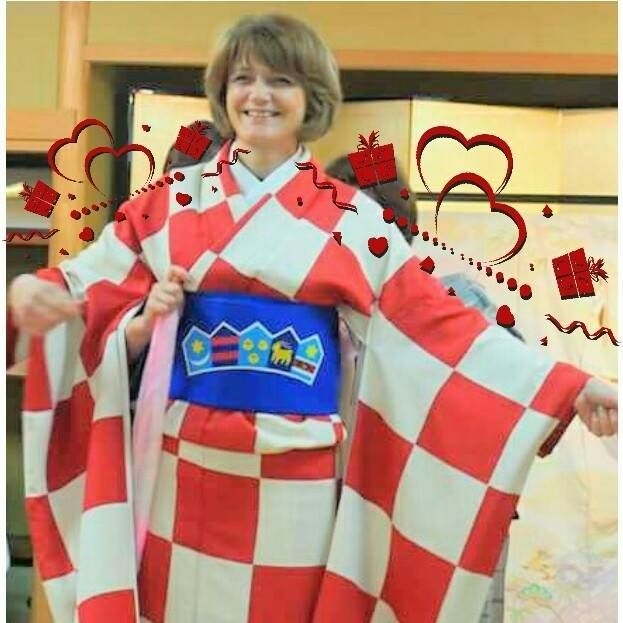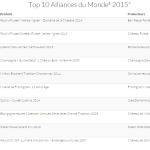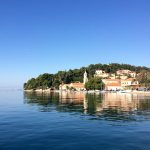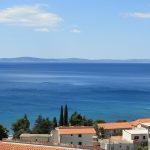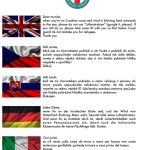Yamasaki is the only Croat with permanent residence in Osaka for the past 20 years, while three years ago at the initiative of former Japanese ambassador to Croatia she brought Japan and Osaka to Zadar. It was at the first Tuna, Sushi & Wine Festival
Since its first edition the Zadar gastronomy spectacle Tuna, Sushi &Wine Festival cannot be imagined without one person – Jelena Yamasaki. Her good spirit, omnipresent at both editions of the five-day manifestation devoted to tuna from Zadar farms and the multi-century Japanese dish sushi, equally left a mark on TSWF and everything else. In fact, she embodied the original idea of the festival on the economic, gastronomic and cultural exchange of Japan and Croatia, or Osaka and Zadar. This is her story, as published in Zadarski List on January 30, 2017.
Jelena Yamasaki is 45 years old and was born in Zagreb. Several months ago she enrolled in Osaka University to study tourism, over twenty year ago after her first tourism experience through the global tourism agency Tui. She speaks English, Spanish and Japanese. When not in Zadar during the TSWF as a representative of NPO JCEA (Japanese-Croatian Exchange Society) or the honorary consulate of Croatia in Osaka, she diligently browses the area to find a suitable apartment or house for the life she plans in the future. In Osaka she works in her own tourism agency for which, as a foreigner, she needs a certificate of a domestic agency. She has gotten accustomed to everything, or almost everything, people from different cultural circles might see as cultural torture: obligatory opening of doors for men, pouring drinks and ceremonial obedience to male family members or a countless number of unwritten rules from at least a thousand years of tradition.
But, she never gave in to the Japanese style of life without resistance or a fight. Even now, she says, she uses common sense to confront rules the Japanese blindly follow. For example, when in the town pool the whistle marks it is time to exit the pool and exercise to relaxing music, Jelena protests as she feels like swimming, or refuses to accept the obligation which tradition imposes to take care of her husband’s family.
Jelena is married to a graphic designer Yamasaki Sakitoshi with whom she has two children: 15-year-old Teo and 8-year-old Nino. They met in Osaka in the 1990s and according to Jelena, the traditional roles in the love game were swapped; until Sakitoshi gave in. He was born on Okinawa, today known by the oldest living people in the world, with 34 hundred-year-olds for every 100 thousand people.
“People from Okinawa are atypical Japanese; they are physically different, speak a different language and in mentality are more similar to Dalmatians (the residents of Dalmatia) than Japanese,” says Jelena. Mrs. Yamasaki looks fragile, but looks deceive in her case. Her genes are from Pokrovnik in the Šibenik hinterland, a rough area.
Her Japanese epopee was born in Zagreb in mid-1990s when Jelena searched for a way to heal souls lost in wartime horrors through Japanese tea ceremony. She was attending a free Japanese culture workshop and then spent some time in the Canary Islands at the world renowned resort Tui, where she met with hospitality and tourism.
“After a year at Las Palmas each day was the same and I wanted more from life so I came back,” explains Jelena, who never completed her study of teaching and agronomics due to her Spanish adventure, but did graduate from the Hospitality-Tourism school in Rijeka. Upon her return she tried her hand in Japanese tea ceremony. She also got the opportunity to depart for Japan and perfect her skills, which she thought would help her aid people with war trauma and PTSD. She was given a tourism visa which did not enable her to work nor pay for expensive Japanese language classes, but she did find a teacher in then 87-year-old Yoshiko Nishizawa with whom she lived.
“I had the means to pay for the plane ticket and nothing else. Teacher Yoshiko agreed to teach me the tea ceremony for free and let me stay with her,” she explains her arrival to Japan. She communicated with Mrs. Yoshiko in English. Yoshiko secured a cultural visa for Jelena so she may at least work four hours per day, her previous tourism experience landing her a job at the top-notch hotel New Otani in Osaka. She went through all the basics: from a hotel bell girl, concierge to receptionist, teaching English at the same time to make a few more Yen. During 1996 her sister Kora visited her in Japan, when she met Yamasaki.
“For two years I lived in Japan and had no friends. When I met Sakitoshi, I began to hang out with his friends and my life became more social,” Jelena recalls.
All the jobs and activities she wanted to do or chose, were tied to Croatia. For the past 20 years.
“This keeps me strong and I use any opportunity to come back to Croatia or be useful through volunteering,” says Jelena of how she got the idea in 2004 to establish the Japanese-Croatia Exchange Society. Mrs. Yamasaki was a one-person tourism community who volunteered in the honorary consulate in Osaka and helped the Croatian Embassy in Tokyo, with her own tourism agency Office TeNiTaMa. And then two years ago began the Tuna, Sushi & Wine Festival in Zadar.
Japanese gastronomy known as washoku is listed as UNESCO intangible heritage together with tuna which combined in sushi is the most recognised specialty of the cuisine. The idea that slightly soured rice with raw tuna be presented in Croatia at a unique tuna festival came from the former Japanese ambassador in Croatia Keiji Ide. Guided by his own slogan “Tuna connects people!,” the ambassador counted on Croatian tuna farms, whose quality is very respected by the Japanese and presenting his own country through exchange of gastronomy, culture, economy and tourism. As almost all tuna farms are near Zadar, the festival location was easy to choose. Zadar tourism board reacted quickly, ambassador Ide organised the first edition and Jelena and her Society blended it all into one lovely tourism event.
“Ambassador Ide began the entire story and then let the festival develop on its own, which is a good attitude,” said Yamasaki, confirmed by the fact the festival went from the original idea to a spectacle which marked the tourism and festival offer in the post-season period in Croatia. Jelena took on the Japanese part of the story which includes sushi, famous Japanese chefs and tuna slicers. Still, not everything went smoothly.
The central idea was for the festival to begin with ritual slicing of tuna, a demonstration of the preparation and tasting of sushi and supporting exhibitions of Japanese culture and tradition, but the withdrawal of the Osaka company that was due to provide the content only a month ahead of the festival, everything had to be changed.
“It was the worst month of my life. The festival announcement was already in the media and we had nothing. But, I decided the festival must take placed even if I have to mask myself into a Japanese,” recalls Yamasaki who had to find everything in 30 days: chef, tuna slicer and artists for exhibitions in Zadar. Luckily, she managed it all for a festival she devoted her full attention, energy, thought and personality.

